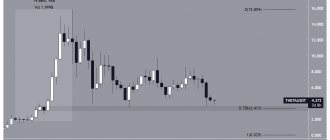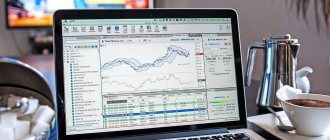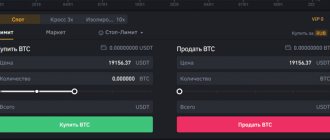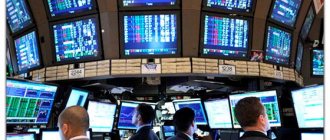Hello, dear reader!
The volume of global trade on world exchanges is tens of trillions of dollars. In the world's leading economies, stock exchanges play the role of a mechanism for receiving investments and evaluating companies and their activities. Moreover, trading on the stock exchange is available to anyone.
There are no special requirements for a potential investor. It is enough to enter into an agreement with a broker and you can start investing. There are different types of exchanges, which will be discussed further.
What is an exchange and why is it needed?
An electronic trading platform for concluding transactions between professional market participants on a number of instruments (securities, commodities, currencies, derivatives) is a modern exchange.
An important tool for a company to receive investment at the national and international level. A joint stock company becomes public and puts its shares up for public trading. Real supply and demand determine the market price of its shares and market value. By buying shares, an investor invests his money in the company's business.
Hurry up to take advantage of the doubling of the tax deduction until December 31, 2022.
Professional brokers provide access to trading via the Internet to individuals and legal entities.
Objects of auction
Trade objects can be:
- Useful resources (gas, ore, oil).
- Securities and shares of various companies and banks.
- Bank checks and currencies of different countries.
- Consumer goods (food products, raw materials).
- Information technology.
- Electronic money (cryptocurrency).
- Objects of intellectual property.
- Precious metals and stones (gold, diamonds, platinum).
- Cash debt obligations (bonds).
Classification and types of exchanges
The general approach to classification is below.
By type of product offered
The instruments traded on the stock exchange determine its direction - stock, commodities, foreign exchange. It should be taken into account that today it is rare to find only stock or commodity in its pure form.
As a result of historical development and the process of mergers and acquisitions, they are typically global conglomerates with several businesses. Large stock exchanges often include trading areas not only for securities, but also for derivatives and currency pairs.
Stock
Shares, bonds, and other securities can be bought and sold on the stock exchange. Later, some of them added other instruments - derivatives, currencies. Any state with a more or less developed economy has stock exchanges. There are them in New York, Tokyo, London, Shanghai, Sao Paulo, Sydney, etc.
Commodity
Trades in real goods are carried out by commodity exchanges (energy, agricultural products, metals). The main form of contracts is futures with delivery or money. Deliverable futures involve the shipment of actual goods on specified terms.
Large world exchanges - London LME, Chicago CME, Shanghai Futures Exchange.
Foreign exchange
After the collapse of the gold standard in 1971, the interbank global currency market FoRex emerged. This is now the main place for currency trading.
For a long time, the main Russian platform was called the Moscow Interbank Currency Exchange. She actually started with currency trading, now this is one of the platforms. Information on the progress of trading is broadcast on the Moscow Exchange website (select “Currency” in the menu).
According to the principle of organization
Since their inception, exchanges have operated on the principle of a private partnership or association of its members. Merchants had shares, decisions were made at a general meeting.
The trading rules were determined in the same way. Over time, trading volumes grew, and exchanges began to play a larger role in the global economy. The ownership scheme became more complicated. Just as the legislation regulating such trade as an economic subject has progressed.
The forms of ownership by primary owner are described below.
State
The state exercises full or partial control over the activities of exchanges.
Examples - in Uzbekistan, the Tashkent stock exchange, the controlling stake is held by the state. The Shanghai Stock Exchange in China is under state control.
Private
The main form of ownership in Europe, USA, Canada. No wonder. Private capital plays a major role.
The world's largest exchange operator, Intercontinental Exchange, is a completely private form. $2 billion net income for 2018. NYSE is part of this family. The famous Wall Street is regulated by private businesses. The monster Intercontinental Exchange was founded by Jeffrey Sprecher in the early 1990s. To this day, he remains the CEO of his brainchild.
Mixed
When the state does not want to lose control over such an effective economic structure as stock exchanges, but would like to increase the efficiency of its operation, private structures are involved. A public-private partnership is being created, where everyone has their own role. Private business invests and organizes the work process itself, the state regulates and controls the rules of the game.
A striking example is the MICEX. Although the exchange has become a public company (an IPO was held), the state has great influence on the work of PJSC through companies with full or partial state participation - the Central Bank, Sberbank, VEB.
According to participants
There are open and closed exchanges based on the admission of trading participants. What are the differences, I will analyze further.
Open
When anyone can enter into a direct targeted transaction on the exchange with a counterparty. These were the first exchange platforms. Remained in the past. Today, this form does not work on leading sites.
Closed
Only a professional broker with a place on the stock exchange has the right to trade. The most common scheme of operation of a modern exchange. Others have access through an intermediary broker.
By role and place in international trade
In the stock market, the favorite for trading securities is the New York Stock Exchange. The leader in derivatives turnover is the Chicago Mercantile Exchange. The NYMEX division has the largest volume of energy futures transactions. LME in London sets prices for non-ferrous metals.
Exotic
Small stock exchanges in third world countries. Example - shares of 10 issuers are traded in Laos. Or the South Pacific Stock Exchange with 3 brokers.
How it all started or a little history
In the 12th century, the prototype of modern stock exchanges appeared in western Flanders (modern Belgium). The auction took place on a large square in the center of which stood the house of the Van Der Beurse family. It was the word Beurse (from the Latin word bursa - purse) that formed the basis of the modern word exchange.
Well, the Amsterdam Stock Exchange is rightfully considered the oldest in the world. It was founded in 1602 for the needs of the Dutch East India Company, and it still exists today. True, it has now transformed into the international company Euronext, merging with the Brussels and Paris stock exchanges.
And then, in the seventeenth century, it was here that trading in the first securities first began. Bonds (government loans of Holland, England, Portugal) and shares were traded here (first of all, of course, these were securities of the Dutch and British East India, and then the West India trading companies)
Soon after this, in 1608, the first commodity exchange opened in the same Amsterdam. It was here that the foundations of modern commodity exchanges were laid, namely:
- Trade by samples and samples of goods was introduced;
- Quality standards for goods were introduced.
That is, it became possible to trade without bringing the entire volume of goods being sold to the exchange.
The world's oldest stock exchange, Amsterdam, outside and inside
Initially, an exchange was a place where trading people gathered to enter into various trading transactions with goods or securities. Before the advent of computer technology, stockbrokers verbally agreed among themselves to buy or sell a particular financial instrument or commodity. In our age, the lion's share of trading takes place electronically.
How the exchange works
Today the exchange uses electronic trading. Access to trading is available through dedicated broker channels with the exchange or via the Internet.
The exchange as a trading platform determines the rules of operation, the broker is a professional participant with his own place on the exchange. It operates on the basis of an agreement between the broker and the exchange. An ordinary client enters into an agreement with a broker, who, as an intermediary, provides access to trading services.
Clearing House
Hundreds and thousands of counterparty transactions are made in an instant during a trading session. With the conclusion of a transaction, the right to own shares, derivatives, and commodity assets passes from one participant to another. There are many trading transactions for which it is necessary to balance the accounting of income and losses.
To summarize the interim total with the balance sheet for each participant, trading is stopped for interim clearing during the main trading day. Upon completion, the main clearing is carried out. For each trader, the final arithmetic of profitability and losses is compiled.
Settlements for clearing and mutual obligations on the Moscow Exchange are carried out by a subsidiary (100% participation) - NPO National Clearing Center.
Trading schedule indicating clearing time (source - organization website).
Depository
Previously, securities - stocks, bonds - were printed on paper. They were registered or bearer.
The circulation of paper shares continued until the second half of the twentieth century. With the advent of electronic trading and settlements, trade volumes began to grow exponentially. Not only in a week, but also in a trading day, the owner of a security could change many times.
Physically transferring a share in paper form from one to another has become an almost impossible task. Especially if it concerned registered papers. The process of transferring securities from one owner to another has been transferred to electronic form.
Data about nominal owners began to be stored in depository centers. They are managed by specialized organizations - depositories. The storage of shareholder registers is subject to high data safety requirements.
Any client who has entered into an agreement with a broker for services in the stock section simultaneously signs an agreement for depository services, which outlines the procedure and conditions for storing securities in a specific depository.
The main Russian structure (by analogy with the central bank) is the NPO National Settlement Depository. Information on all securities owners flows to him. Data comes directly or from other depository centers.
Broker on the stock exchange
A legal entity that has a seat on the stock exchange and a license as a professional participant in the securities market is a stock broker (another important concept). He carries out both trading in his own interests and acts as an intermediary between the exchange and the end client.
On the Moscow Exchange, the number of professional participants with the right to access trading in the stock section and on the derivatives market is 533. The number of end clients is thousands.
The securities market is regulated in any country. In Russia, the supervisory authority is the Central Bank. Information about issued licenses of professional stock market participants is publicly available on the website.
Until 2013, control over the securities market was exercised by the Federal Service for Financial Markets. Then the rights of the regulator were transferred to the Central Bank.
In the world, control is within the framework of local legislation. In the USA - SEC (The United States Securities and Exchange Commission), in Germany - HÜSt, etc.
Without a license, a company cannot have a place on the stock exchange and provide services as a broker to clients.
Exchange participants
The activities are carried out by professional trading participants (brokers), end clients - legal entities and individuals, depositories, the exchange itself as a trading platform and trading organizer.
Control
Control is exercised by the supervisory body - the regulator. In Russia - the Central Bank, in the USA - the SEC (Securities Commission), etc. In addition to the external regulator, external and internal auditors control. Example - without the conclusion of the audit commission, the balance sheet of the Moscow Exchange cannot be approved.
Stock psychology
Trading on the stock exchange requires a certain psychology, understanding of which is the key to successful activity in the stock market. The key to success on the stock exchange can be a combination of such qualities as the ability to have strict control over one’s emotions and a clear understanding of the motivation for one’s actions. An experienced and successful broker is guided by a clear plan and reasonable analysis, which is suggested by stock market psychology. A disastrous strategy in playing on the stock exchange is to rely on greed, gambling excitement and passion, as well as irrational expectations. Fear is also a dangerous emotion - it can both push into rash transactions and paralyze actions.
Advice from Sravni.ru:
To play on the stock exchange and make money here, you will have to use the services of a broker. There are large companies that provide such services. The principle of leverage or financial leverage is used here, when the amount you invest is proportionally increased by the broker so that you are able to trade. Payment of profits is also carried out in predetermined proportions.
Advantages and disadvantages
Advantages of access to trading for an ordinary individual on the exchange platform:
- The benefits of investing with minimal time investment. In the long run, all markets grow. You can create an investment portfolio yourself or with the help of professionals, using the formed portfolio of investment companies as a basis. The composition of assets is often deciphered.
- You can make money both from dividends and from the growth in asset values.
- For investments, the market offers different instruments with different risks - from weather futures to shares of global brands and real goods.
- Many assets are traded around the clock, with breaks on weekends and holidays.
- There are no requirements for the investor. In addition, he must invest his own money. No one cares about age or having a higher education. This is a field for everyone.
- To become an investor or day trader, you don’t need to sit in an office or constantly be in one place or one country. All you need is a smartphone or laptop and Internet access.
There is only one minus. As a business, investing can bring not only income, but also losses.
List of largest exchanges
List of world exchange platforms with the largest role in the global economy.
World
The main centers of stock trading in the world are concentrated in the USA, Europe, Japan and China.
TOP 10 largest world stock exchanges
List of the world's largest platforms as of early April 2022. The NYSE remains in first place by a landslide. In the top ten there are 2 from the USA, 1 from Canada, 3 from China, 1 from Japan, 2 from Europe and the Indian stock is in tenth place.
Russia
The Moscow Exchange is the main one in Russia.
It started in the early 1990s as a platform for currency exchange and trading in government bonds. The first name is MICEX. A few years later, futures trading and a stock section began. The MICEX index began to be calculated in 1997. In 1999, an electronic trading system was introduced.
In 2011, there was a merger with another Russian platform - RTS, on which the main volume of derivatives trading took place - the FORTS section. One of the most liquid instruments, futures on the RTS index, was and is still successfully traded on it. Two years later, the united exchange entered an IPO and became a public company. Shares of the exchange can be purchased by an ordinary investor.
Chart of stock price changes from February 2013 to October 2022.
Capitalization of companies listed on the stock exchange is >30 trillion. rub. It is among the top 25 global platforms by capitalization.
The regional St. Petersburg Exchange is smaller in size and importance. It is interesting because >1000 instruments of American companies are traded on it - shares, depositary receipts, bonds. Almost the entire list of companies from the S&P500 index is presented.
Functions
The functionality of such markets includes:
- Organization of auctions in which anyone can participate. Terms will be transparent and prices will be tracked.
- Determining the value of goods based on market trading.
- Monitoring the implementation of agreements on each transaction.
- Development of transaction rules.
- Arbitration function if the parties do not reach an agreement during the bidding.
- Informing exchange participants.
The main thing that the exchange market should do is to formulate the price of goods for different sections. The remaining functions are to create convenient and transparent conditions for trading for the parties.
Risks in financial markets
Exchange trading involves many risks - from geopolitical ones to the release of regional news. They influence price movement. The trade war between China and the United States could trigger price movements for a number of global companies. Activities of legislators at the local level - regional players. This happened with Yandex shares on October 11, 2019. On news from the State Duma, securities fell by 18% in one day.
Varieties
Commodity exchanges can be universal or specialized. A distinctive feature of the former is trade in different types of goods.
The latter have a specialization, working only with a certain type, for example, metals or energy raw materials.
If we consider the scale of action, then exchanges can be state, regional, regional or city. Visitors (sellers, buyers) and brokers who act as intermediaries can participate in exchange trading.
They act on behalf of employers. Traders also take part. It happens that only brokers participate in the work of the exchange. This is a closed view. Visitors may also appear in the open.
How to access stock trading
Conclude a brokerage service agreement with a professional intermediary - a broker. After completing the documents, the client opens a trading account, registers a personal account, and is given access to trading via the Internet using specialized software. The trading program can be installed on a personal computer and used as a web terminal (without installation).
Be sure to check the license of a professional participant in the securities market. The regulatory body of the RCB in Russia is the Central Bank of the Russian Federation. The website contains information about issued licenses.
Best brokers
First of all, when choosing a broker to work with the stock exchange, I recommend paying attention to the following brokerage companies.
Reliable Russian brokers
| Name | Rating | pros | Minuses |
| Finam | 8/10 | The most reliable | Commissions |
| Opening | 7/10 | Low commissions | Imposing services |
| BKS | 7/10 | The most technologically advanced | Imposing services |
| Kit-Finance | 6.5/10 | Low commissions | Outdated software and user interface |
Caution about BO and Forex
In 1944, the Bretton Woods Agreement was signed, according to which the US dollar was pegged to gold at $35 per ounce. The agreement strictly regulated exchange rates for many years; there was no free market.
In 1971, at the initiative of the United States, the dollar was delinked from gold.
By the early 1980s, the international interbank currency exchange market, forex, had formed. The main players are central and large commercial banks, investment companies. $5 million is the standard minimum transaction size.
Forex dealers advertising services may not display client orders on Forex - virtual transactions are carried out on the dealer's server. Forex kitchen - that's what it's called. Cryptocurrencies are also bought and sold here.
At the level of an individual Forex dealer, he is not subject to legislation regulating the securities market. Unscrupulous dealers use this.
Expert opinion
Vladimir Silchenko
Private investor, stock market expert and author of the Capitalist blog
Ask a Question
A type of service popular in Forex is binary options (BO). If we put aside the verbal fluff, this is a bet in the game. Like in a casino or slot machine. What are the types of BOs - on the direction of movement (top, bottom), reaching a price level before a specific date. If you guess correctly, you win, if not, your bet is lost.
How to make money on the stock exchange: investing vs trading
According to the results of studies conducted on world exchange platforms, >70% of day traders (intraday trading) lose money in the first 6 months.
Only a few traders and investment companies can outperform world indices over a long period of time. Including the MICEX index. Over 10 years, an increase of 4.8 times - from 600 to 2700-2800 today. Available investment strategy - purchase of instruments (ETF, etc.), calculation base - stock index.
Adviсe
If you have just started trading on stock exchanges, here are some recommendations to make the process more understandable and profitable:
- Develop a strategy and stick to it. You must have your own trading tactics, taking into account the risks, your style, and the desired result. At the same time, do not forget that the market is changeable, so the strategy must be flexible and adapt to the current situation.
- Constantly research the stock market, analyze what is happening. The market is changing and you must be prepared for it. Study trends, follow news and events, improve your skills, develop more effective strategies.
- Stay calm and control your emotions. It is better not to make impulsive and emotional purchases. Think about your every step so as not to lose money, but only to increase it.
- To conduct a full-scale analysis of your activities, identify weaknesses, monitor successful and unsuccessful transactions, keep a diary. In it, write down the transactions performed, expected and actual profits, strategy, losses. Records will allow you to draw conclusions about your work over a certain period of time and identify weaknesses.
- Remember the broker's percentages. When closing transactions, deduct the interest going to the intermediary. If the commission prevents you from achieving a tangible profit, then you should think about changing the broker.
How to trade on the stock exchange
Basic rules for a newbie on the stock exchange:
- Don't use leverage. This immediately makes the risk of losses two orders of magnitude higher.
- Start with Russian shares of liquid companies - blue chips. On the Russian market, the best choice for starting is shares of Gazprom, Sberbank, Lukoil. Derivatives, currency - the second step as you gain experience.
- Create your own trading style. Psychologically comfortable and suitable for the size of the trading account.
- Constantly learn stock market wisdom. This is a professional market.











